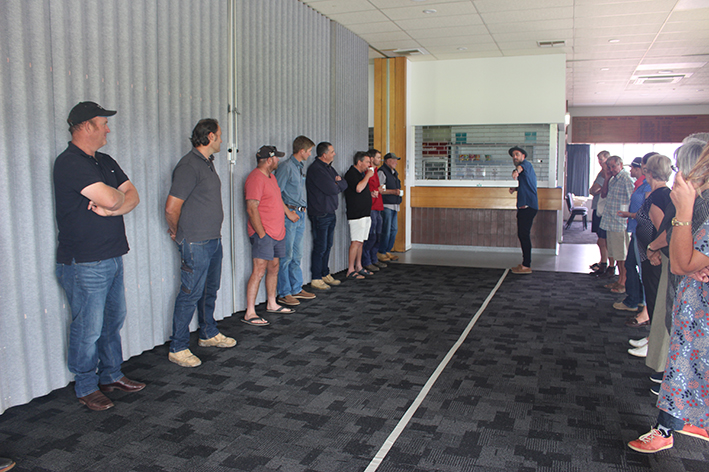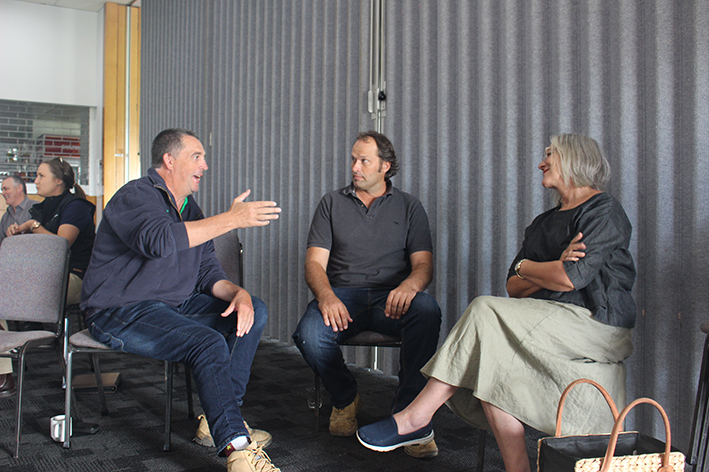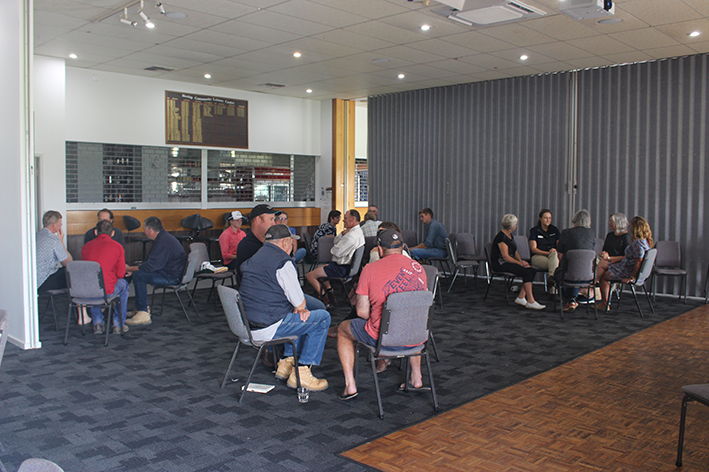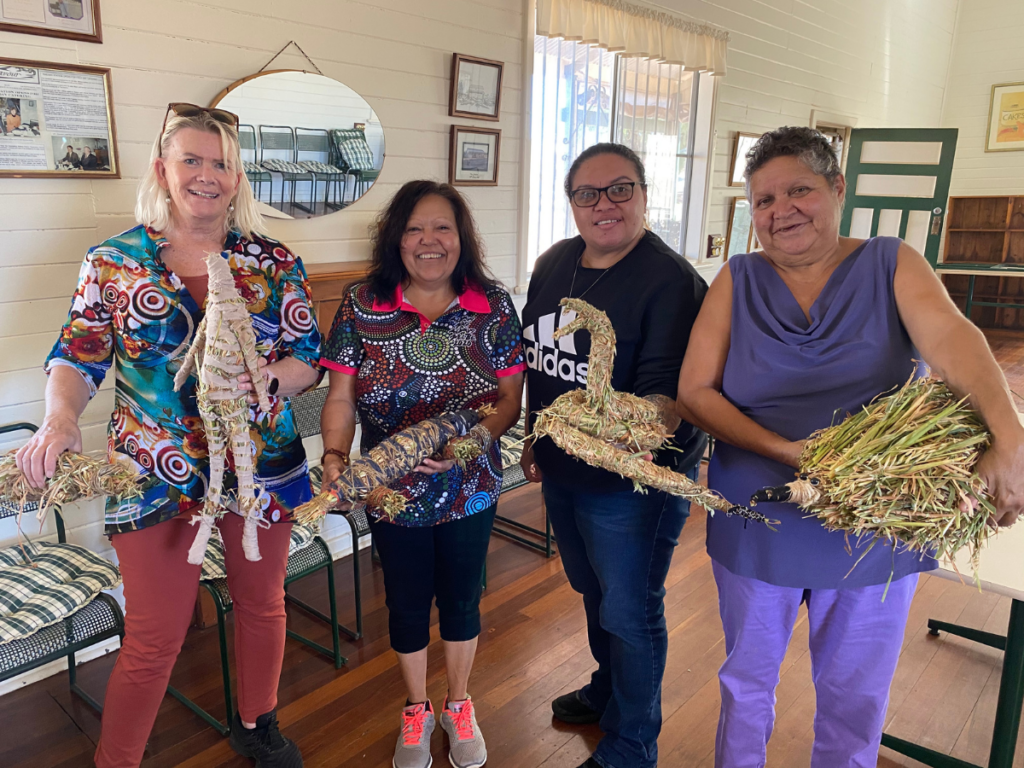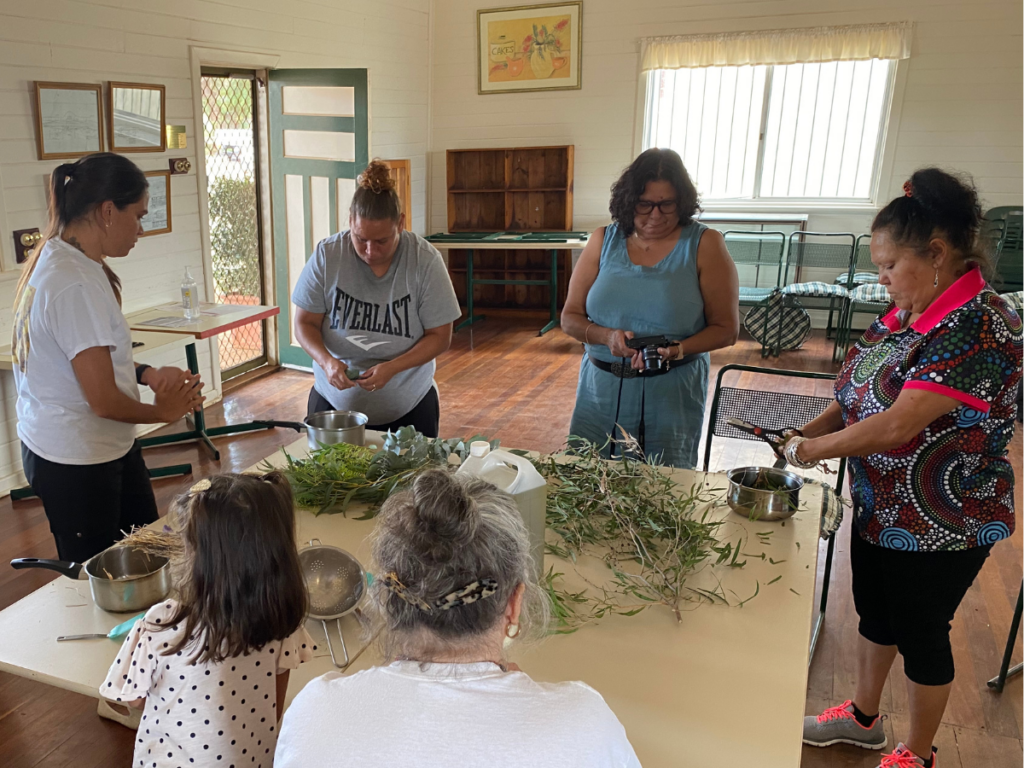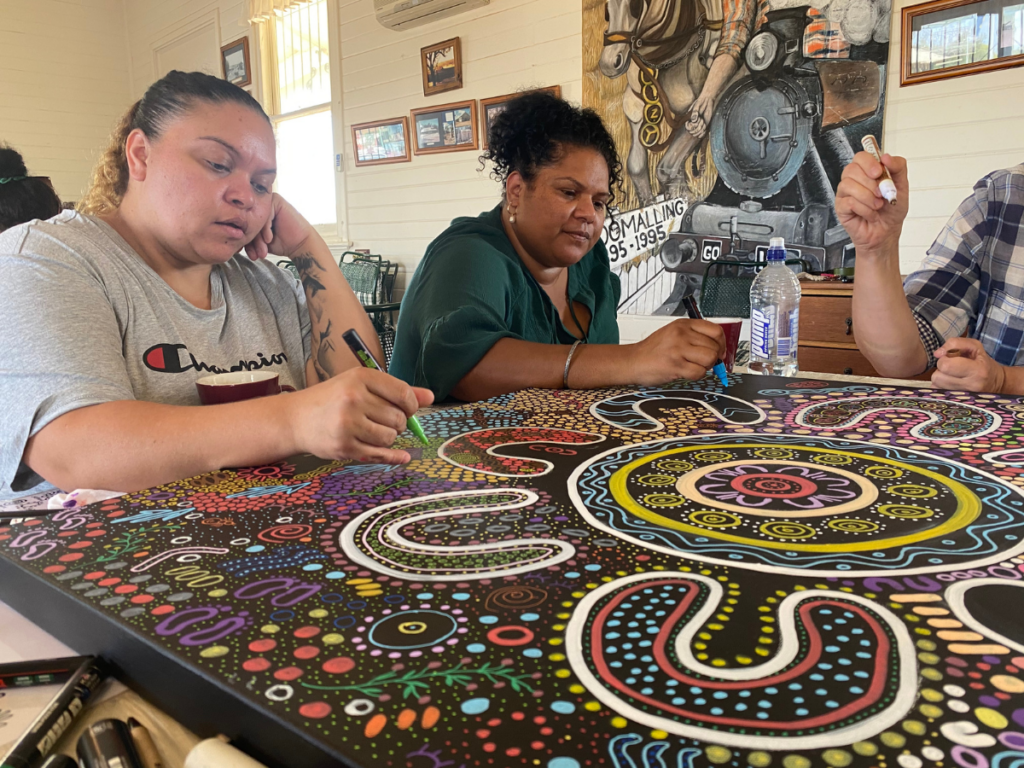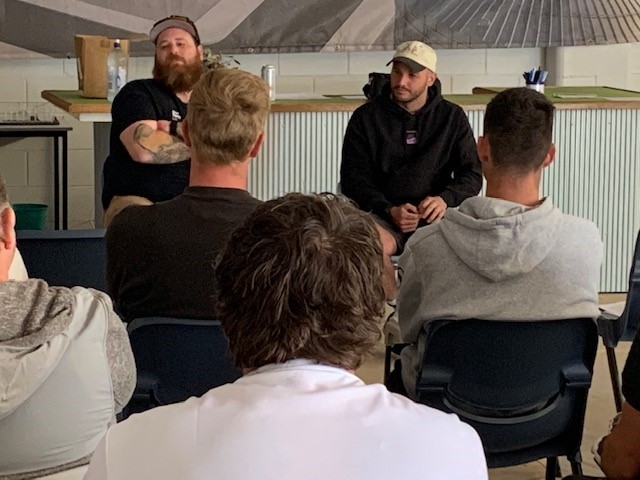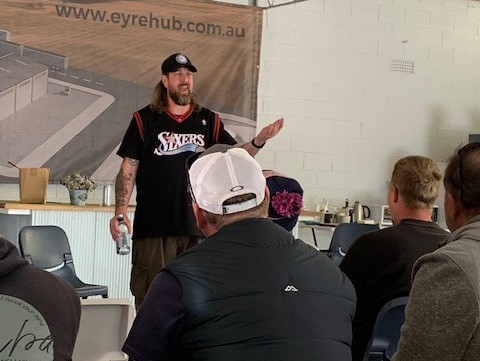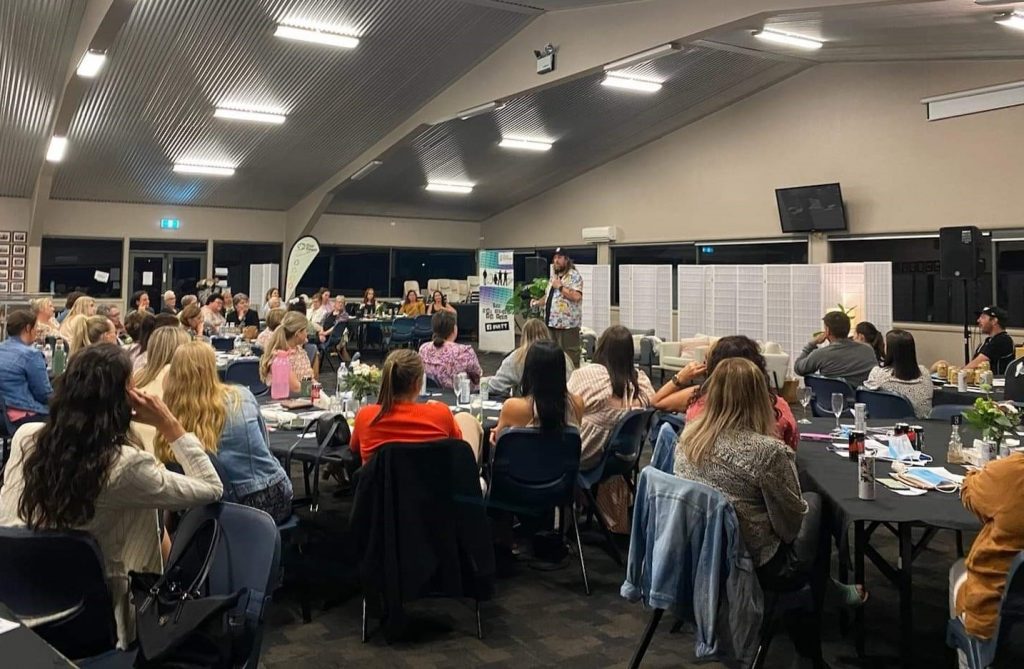Foundation for Rural & Regional Renewal (FRRR)
Farm businesses are inherently stressful workplaces. Managing the vagaries of climate change, working with family members, and doing so in an isolated farm environment, can be hard.
Often in farming, family and business are intertwined. The Birchip Cropping Group (BCG) was hearing from local farmers about the consequences poor communication can have on the farm business, the bottom line, safety and mental health.
Feedback from young farmers had identified poor communication as a key source of stress, anxiety and isolation, which subsequently has negative effects on their mental health.
BCG secured an In a Good Place grant to hold a one-day Tomorrow Farmer event, to discuss the skills that all members of the farming operation require to have the crucial conversations about farm business prosperity, without compromising the social fabric of a family. The event focussed on how to manage and maintain positive mental health during these conversations. Improving their ability to communicate and have the ‘difficult conversations’, often across generations, was the aim of this project.
After rescheduling three times due to lock downs, the training, which was led by Tom Bell from Tomorrow Man, was held on 16 March 2022. And it wasn’t just for men – it was open to everyone interested and there was a broad cross-section of ages that attended.
Approximately 40 farmers, advisers and industry representatives attended the event with a further 20 people registered but unable to attend due to needing to isolate as per COVID guidelines.
While the numbers were less than anticipated, this allowed the group to participate in interactive sessions without the need for a panel session. Tom created a safe and intimate environment for people to feel comfortable asking questions and sharing experiences throughout the sessions.
The sessions covered active listening, asking the right questions, storytelling for connection, being authentic, and knowing when to call in extra support to make important decisions.
The engaging and participatory event provided a framework for ongoing, open and honest communication – a tool as useful as any other in a farmer’s toolbox.
When surveyed about the benefits gained from the event and what tools they planned to implement as a result of attending, the resounding answer was to ‘listen more!’.
“It was one of the best events to meet people in the BCG in my experience and I found it to be a very energising day. Thank you!”
New partners join FRRR’s In a Good Place program
More funding is now on offer to support mental health projects in remote, rural and regional communities, thanks to new supporters of FRRR’s In a Good Place grants program, with grants of up to $20,000 are now available.
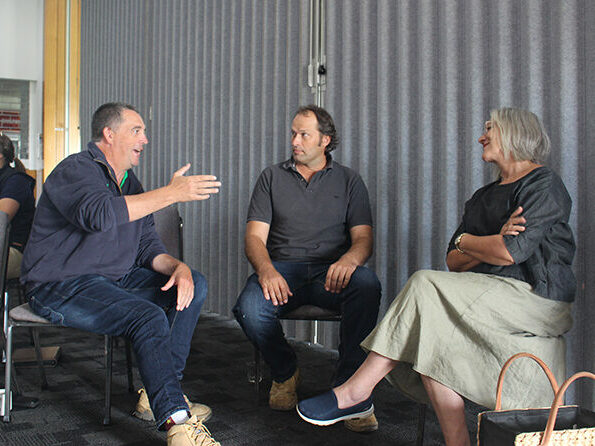
First established in 2018 with the support of CCI Giving, the program’s focus has been on supporting community-driven initiatives that reduce social isolation, increase social participation and connectedness, and increase help-seeking for people within rural, regional and remote communities who are at risk of, or are experiencing, mental health issues.
Now the IAGP program is expanding, adding a stream focussed on farmers and farming communities, following the recent National Farmer Wellbeing Report, which was presented at a recent mental health and wellbeing forum, hosted by National Farmers Federation (NFF).
The Report revealed that in recent years, 45% of Australian farmers have felt depressed, with 64% experiencing anxiety. The causes of this are many-fold, but top among them were weather or natural disasters (47%), financial stress (36%) and inflation and cost pressures (35%). Add to this that 76% of Australian farmers believe that the role they play is undervalued by the Australian public and it’s not hard to understand why farmers and farming communities are experiencing declining mental health.
The Report called for additional funding and support, which prompted six new partners to join FRRR’s IAGP program, alongside CCI Giving – Macdoch Foundation, Jibb Foundation, Morris Family Foundation, Norman Family Foundation and Rebecca Gorman & John Sevior.
These funders have committed to the program for three years, ensuring dedicated funding for farmers and farming communities from 2024-2026. In total, $1,063,000 has been committed over the next three years.
FRRR’s CEO, Natalie Egleton, said that the insights shared by farmers and farmer advocates, reaffirm the relevance of the In a Good Place program, and the role it can play in supporting the wellbeing of farming communities.
“These firsthand experiences and insights, highlight the need for investment in projects that promote preventative and responsive mental health approaches in farming and agriculture-dependent communities.
“Critically, the additional funding will help to address gaps in services by upskilling people locally and bringing in experts, so that locals in farming communities can better support one another.
“Thanks to the generous support of our new partners and CCI Giving, we can build on from the valuable impact that the IAGP program has had on rural Australia over the last six years, by ensuring farming communities can access more funding to develop the community-led, place-based solutions that make sense, locally,” Ms Egleton said.
Jeremy Yipp, Chair of CCI Giving, is also pleased to see the expansion of the program.
“The events of recent years have added complexity to the challenges that remote, rural and regional communities face. But we’ve seen first-hand that by supporting projects that remove barriers to people getting appropriate support, we can make a lasting difference. So it’s wonderful to have more organisations coming on board, enabling FRRR to support even more non-clinical approaches that are community-based and accessible at a grassroots level. It will mean that even more communities can access support,” Mr Yipp said.
Michelle Gortan, CEO of Macdoch Foundation, one of the new partners, said that due to increasingly variable weather conditions, financial and market pressures, and the need to navigate industry and land use transitions, there is a need to ensure farming communities are feeling well-supported.
“Maintaining good mental health and community wellbeing is multi-faceted and a lifelong process that requires a range of different approaches. We recognise that local communities know what will work in their particular context, and as a collective of funders, we are delighted to be partnering with FRRR so that that agricultural communities can design and implement community-led solutions that are fit for purpose.
“FRRR’s special tax status means that as partners, we can respond practically to the issues raised in the National Farmer Wellbeing Report and ensure funding reaches grassroots communities to support improved community wellbeing and mental health, which ultimately helps to create a stronger Australia,” Ms Gortan said.
The expanded program supports a range of approaches that are preventative or responsive in nature, reduce social isolation by increasing social participation and connectedness, and reduce stigma surrounding mental health by encouraging open discussion and supporting self-help-seeking. Communities of less 10,000 will receive priority.
Grants of up to $20,000 are available from a funding pool of at least $290,000. Grants are available via two streams:
- Community wellbeing – focussing on mental health and wellbeing within remote, rural and regional communities;
- Farmers and farming communities – supporting mental health and wellbeing of farmers and the communities they live in.
Applications are via an expression of interest process, with EOIs due 30 April, with final applications for those shortlisted due 15 May. Learn more at: https://frrr.org.au/funding/place/in-a-good-place/.
FRRR would also welcome more partners for this program. Potential supporters should contact partnerships@frrr.org.au or call 03 5430 2399.
Beyond the Bell Great Southern Coast applied to the In a Good Place program, on behalf of the Southern Grampians Live4Life Partnership Group, for funds to support the implementation of the Live4Life model in the Southern Grampians Shire.
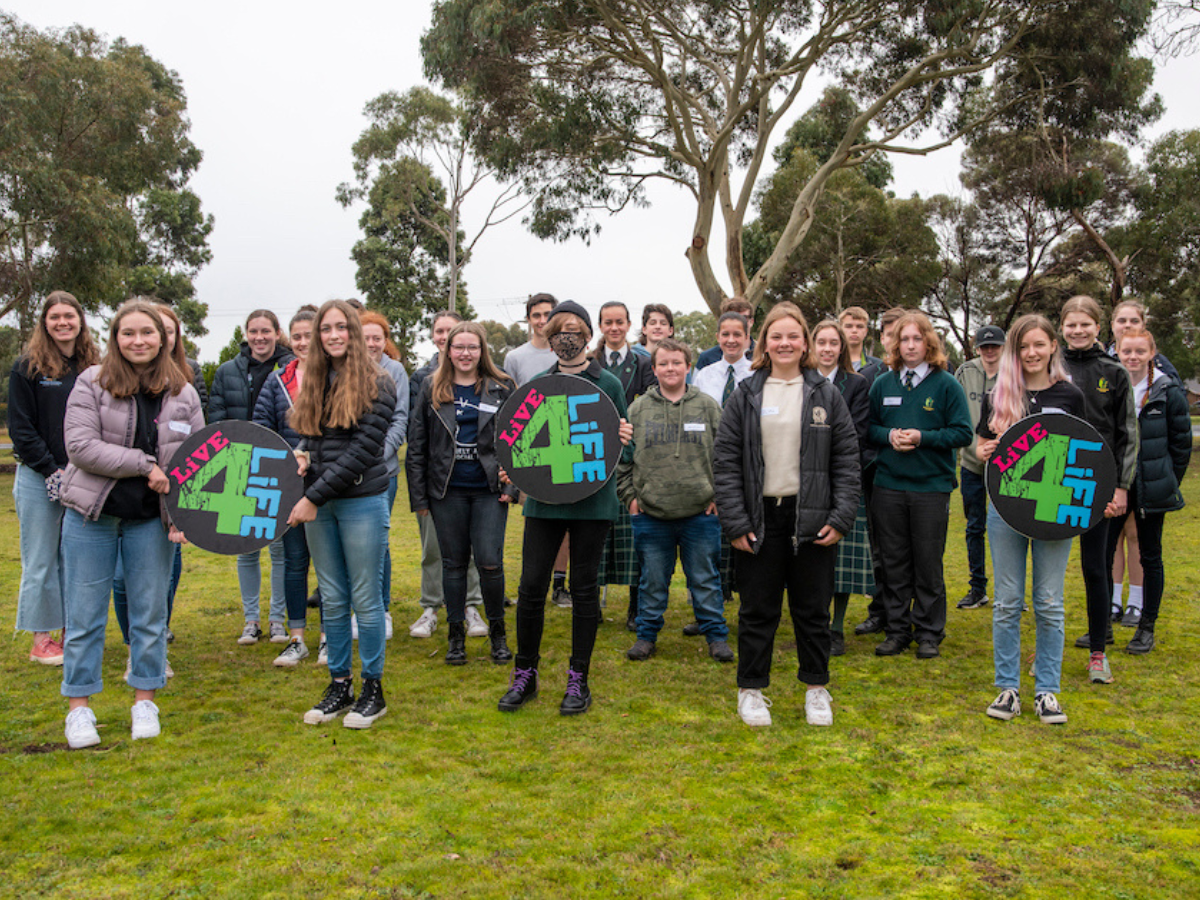
Live4Life is a community-grown, evidence-based, rural youth mental health model designed to prevent youth suicide. The Live4Life model aims to ensure that young people, teachers, parents and the wider community are better informed about mental ill health so they can be proactive in identifying the signs and symptoms of an emerging mental health issue before a crisis occurs.
The Live4Life model focuses on an ‘upstream’ approach to mental health education and suicide prevention to build resilient young people and communities. This is achieved by ‘wrapping’ protective factors around young people such as supportive relationships, support at critical times, positive help-seeking attitudes, connection to family, school and community and positive peer role models.
The school-based project to support Youth Crew activities and mental health education was all geared up ready to go when COVID first struck and schools and communities across the country went into lock-down.
After a year of navigating the challenges of not being able to deliver face-to-face programs and other challenges such as the loss of the Youth Engagement Officer, who normally coordinates the crew activities, the group developed new strategies and approaches that enabled them to successfully deliver the activities in a COVID-safe manner, including a new model of blended Youth Mental Health First Aid (YMHFA) training.
The group was highly successful in maintaining the momentum of the project, despite delivering a personal development program and training in a lock-down environment. They launched a social media presence on Instagram during Mental Health Week and created various collateral and promotional materials such as stickers, posters and help-seeking flyers to use in info packs to be distributed to students at in-school promotional events.
Once the Partnership Group was able to recommence activities within the community, they successfully delivered a series of Leadership and YMHFA courses and training sessions using a mix of face-to-face session and a blended online model via Zoom, reaching across six schools and eight allied community-based organisations that work with young people.
The organisation reported that what they were most proud of about the expansion of the Live4Life project into the Southern Grampians Shire, which they estimate has directly benefitted at least 950 people, was the engagement of the young people who joined the Live4Life CREW. They also mentioned the local YMHFA Instructor training, which has increased the community’s capacity to deliver more training across the Southern Grampians region.
The lastest news on the project from the Southern Grampians Live4Life website reports:
The project has led to increased community capacity and shared awareness of preventative mental health strategies through the MHFA training, as well as a deeper engagement with the Partnership Group in a broader context. They report that there is a noticeable increase in collaboration across the Southern Grampians area, possibly due to participation in the Live4Life initiative that connected people and agencies / organisations, and promoted collaboration centred on young people in the Shire.
“I think the most rewarding part of being in the Crew is seeing the difference you’ve wanted to achieve happen. Getting people into the idea of talking about mental health is hard but I think it’s slowly starting to happen, with the Crew being a part of that change.” – 2023 Crew member, Southern Grampians
By Jeanice Henderson, In a Good Place Program Coordinator
Despite the many positive aspects of living in remote, rural, and regional communities, there are also distinct challenges associated with distance and isolation, which place these communities at greater risk of poorer mental health outcomes.
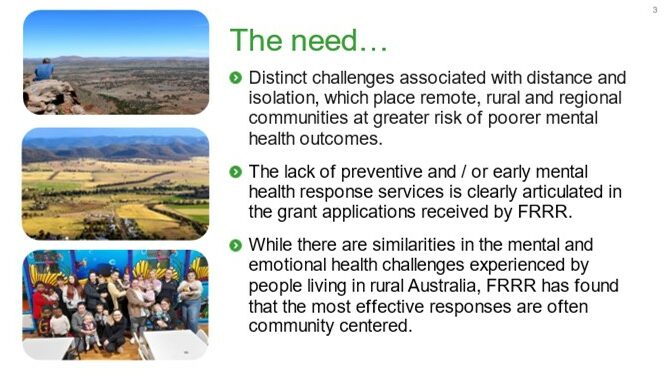
These include:
- Lack of available service or long wait times;
- Poor, interrupted or lack of digital services and access;
- Reduction in volunteers, business closures, job losses, loss of agricultural markets;
- Poorer outcomes in the social determinants of health;
- Life on the land can be hard – drought, fire, flood, mouse plague, cyclones; and
- Stigma, shame, and ‘stiff upper lip’ attitudes to mental health.
The compounding and accumulative effects of some or all of these things take their toll – on individuals, families and the communities they live in.
Local solutions need support
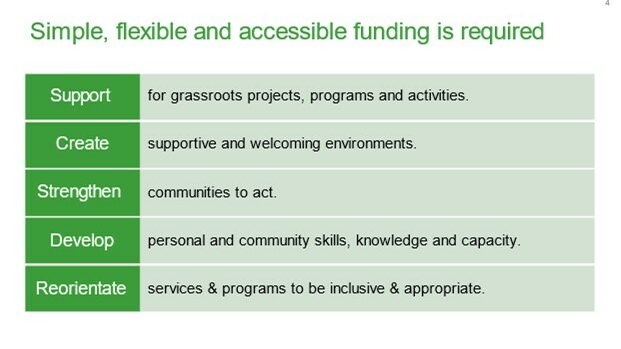
At FRRR, we have found that the most effective responses to these challenges are often community centered but lack access or visibility to government or philanthropic funding.
Simple, flexible and accessible funding is required to support projects, programs and activities that create supportive environments, strengthen communities to act, develop personal skills and support services to re-orientate their programs to be both inclusive and appropriate for all.
This is where philanthropy can play an important enabling role, especially for grassroots organisations that often can’t access traditional philanthropy.
Small grants can be the straightforward and friendly ‘front door’ through which grassroots organisations can step to build their capability, connect their community and navigate and drive change.
In fact, for many communities experiencing disadvantage, small grants are one of the few ways that they can get the resources and opportunities to launch new ideas or approaches in their communities.
While not always ‘sexy’, the projects and the needs met through these grants, can address areas of disadvantage and inequity in communities that often have little visibility to funders and policymakers.
We’ve seen this be particularly effective when those small grants are targeted toward addressing specific needs. A case in point is in the area of mental health.
In A Good Place
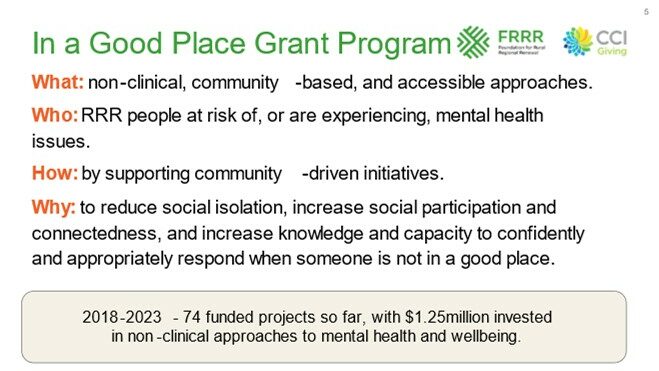
In a Good Place is a national philanthropic grant program, delivered by FRRR and funded in partnership with CCI Giving.
This aim is to support people living in remote, rural and regional communities seeking help who are at risk of, or are experiencing, mental health issues.
The program has a relatively small, flexible funding pool of $250,000 per year, and offers grants of up to $20,000 to enable rural communities to action their ideas and solutions.
Our focus is to support efforts to strengthen the mental health of at-risk or vulnerable people via services or activities that are preventative or responsive in nature and designed to engage those less likely or unable to participate in mental, social and emotional wellbeing activities.
This program truly reflects the FRRR ethos that local communities are best placed to identify local needs, local opportunities and lead local responses.
We have run the program since 2018 and have so far funded 84 projects – that’s $1.25 million in small grants invested into remote, rural and regional communities to support non-clinical approaches to mental health and wellbeing.
We’re very proud of it, but it’s really a drop in the ocean, as demand for this kind of support is very strong – and only increasing. Between 2018 and 2023, 397 applications requested over $6,443,348 in grant funding for combined total project cost of $18,981,059.
Further, 24.8% of these were first time applicants to FRRR, as this is one of the few programs of its type. And, in reality, they are not seeking very much funding – the average request was $16,230.
Of the successful applications:
- The smallest grant was $2,970.
- The average grant was $14,935.80.
- 23.8% were awarded the full grant amount ($20,000).
- Our $1.25 million support projects valued at over $4.5 million.
- Local communities are still putting in a lot – the estimated value of in-kind support for funded projects is $1,126,082.
Every dollar granted by the In a Good Place program was matched by an additional $2.61 in other funding or in -kind support.
Demand is high
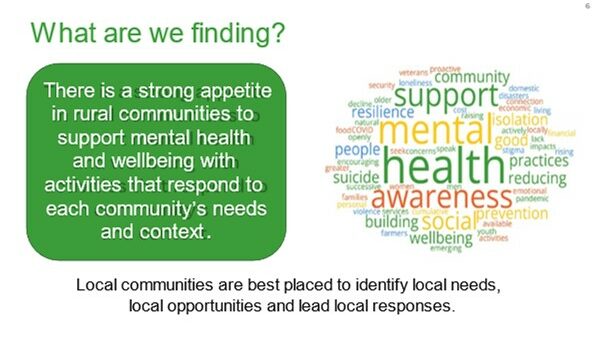
Since the program opened, more than 400 organisations have applied, requesting nearly $6.5 million towards projects with a combined value of over $19 million.
Remember, these are for relatively small grants – up to $20,000 – so it’s clear that there is a strong appetite out there to support community mental health and wellbeing.
Who benefits
So, just who is applying for these grants?
The short answer is grassroots community groups. FRRR doesn’t require applicants to have any special status, such as DRG1. This means we receive applications from community groups that are working directly with community members, families, young people, older people, veterans, gender specific focus groups, mental health and suicide awareness groups, community houses and school councils.
The word cloud above comes directly from the themes listed in this year’s In a Good Place applications. While there are different ideas that appear each round, there are some consistent themes and project approaches each round, including:
- Suicide prevention.
- Capacity building such as Mental Health First Aid training.
- Alleviating loneliness and isolation.
- Projects focused on the mental health of specific cohorts – men, youth, aged, students, families, farmers, culturally and linguistically diverse (CALD) communities.
- Community gardens / horticulture, animal therapy, art therapy nutrition and exercise as integral parts of overall mental health and wellbeing programs.
- Mental health and wellbeing awareness activities.
- Events that bring people together, connect with each other.
- Responding to the impacts of cumulative economic, social and emotional impacts of successive natural disasters and COVID.
Emerging themes of late have included:
- Community based support programs for ADF Veterans / First Responders.
- Supporting those affected by domestic violence.
- Responding to social determinants of mental health, such as food security, housing security / homelessness, disability and under / insecure employment.
- Increased recognition and use of lived experience and peer volunteers.
Proven impacts
There are many stories that we could share about the impacts of these grants and how they have contributed to building healthier, resilient and better-connected communities by supporting and promoting mental health awareness, and building individual and community resilience.
I’m Not Afraid To Talk
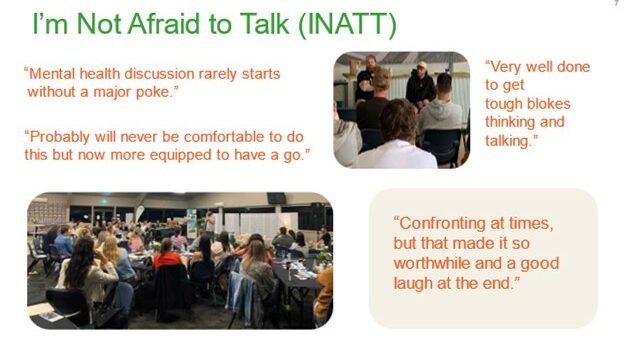
For example – University of South Australia partnered with a community group called I’m Not Afraid to Talk to pilot and evaluate a Men’s Mental Health program. It sought to challenge the stigma surrounding mental health – by doing so in an environment that is very familiar to local men and adolescents – the football club. The aim was to improve mental health and reduce the risk of suicide by providing a safe and informed environment in which to connect with others and normalise self-help seeking.
Working around COVID restrictions, cancellation of the football season, harvesting and extreme weather events, the workshops were held in Kimba, Tumby Bay and Cowell in SA.
Each four-hour workshop featured local speakers who shared their experienced, which was followed by a series of activities that focused on how men may be perceived by others and how they perceive themselves, shared experiences and the importance of ongoing open conversations about mental health.
Comments received after the football club presentations were interesting, but we particularly liked the insight from one man – “mental health discussion rarely starts without a major poke.:
Subsequently, a toolkit was developed by UniSA and INATT to guide the footy clubs in continuing the mental health conversation. The steps and strategies listed in the resource were based on community development principles.
INATT ran an additional workshop for women. This was extremely popular, with more than 80 women attending from Kimba and surrounding communities.
The project leveraged the extremely strong links INATT has with the Greater Flinders and Eastern Eyre communities, which was evident by their excellent leadership and facilitation of the workshops and high attendance, and the expertise of Uni SA in capturing the insights from each workshop and developing the community tool kits for clubs to use.
Melodies, Mates and Mental Health
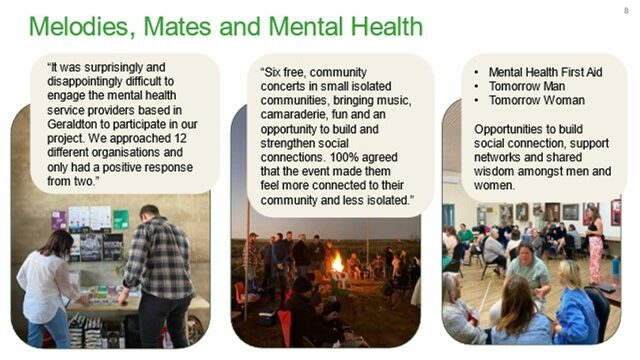
In another example, Mullewa is a small agricultural community in WA, which experiences the challenges of rural isolation, declining population, long distances and dependence on the weather for economic success in farming and tourism. These challenges were putting many at risk of poor physical and mental health, exacerbated by the consequences of COVID which saw events cancelled that traditionally brought people together and sustained strong social connections.
The Mullewa Community Resource Centre used their grant to deliver six free, community concerts in the smaller remote locations in the district. Each event brought people together for a BBQ, music and an interval during which there was a presentation regarding mental health. There was always a collection of resources that people could take home. They also conducted events in Mullewa at the end of the year and at the Mullewa Agricultural Show, which not only attracted the locals but visitors who were in town.
To really drive home the mental health message and develop the skills and capacity of the locals, the Resource Centre engaged a facilitator to run a Mental Health First Aid course. While only nine people attended, it actually meant that one additional skilled person was now available for every 50 adults in their community.
With the remaining funds, they engaged professionals to facilitate “Gather with the Women of Mullewa” and “A Night with the Blokes of Mullewa”, with both workshops focused on open, honest communication about how you are feeling with loved ones, family or friends.
Overall, they estimate about 500 people participated, sometimes more than once. The music events brought people together and built shared memories, while the training events built vital skills and networks and the confidence to use them when needed.
Creating a Safe Space
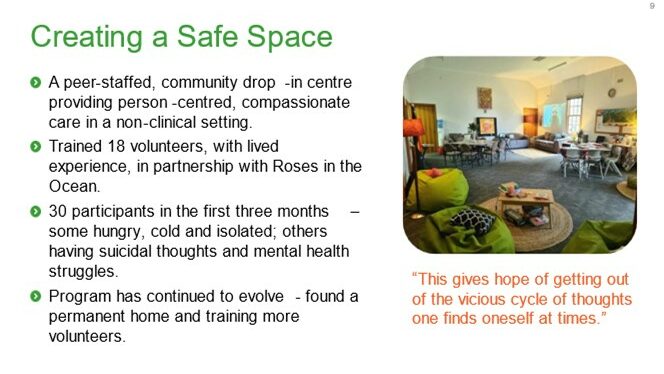
Another great example is local suicide prevention group, Every Life Matters (ELM), who teamed up with the Castlemaine Neighbourhood House to establish the Castlemaine Safe Space. It has become an inclusive venue for people to connect with others when feeling vulnerable.
Working with the local health services, ELM identified when there were local spikes in calls for assistance and pinpointed two evenings per week where there seemed to be a greatest need and aimed to operate over those times.
While the challenge was on to find a suitable location, the group worked with Roses in the Ocean and Living Works to develop a training schedule to support lived experience volunteers to work at the Safe Space during opening times. The In a Good Place program provided seed funding to support the training and purchase some basic equipment for the space.
Eighteen peer volunteers were trained in the first instance, and the centre welcomed more than 30 people through the doors in the first three months. Interestingly, most of them were male.
The Safe Space is now an independent group and has found a more permanent home. They have received additional funding to train more volunteers with lived experience to enable extended opening times and guard against fatigue, and to increase the visibility of the space in the local community. They have also gained funding support from the local Council. This is an innovative project and one that we watch with interest as it develops and progresses.
Small grants, big impact
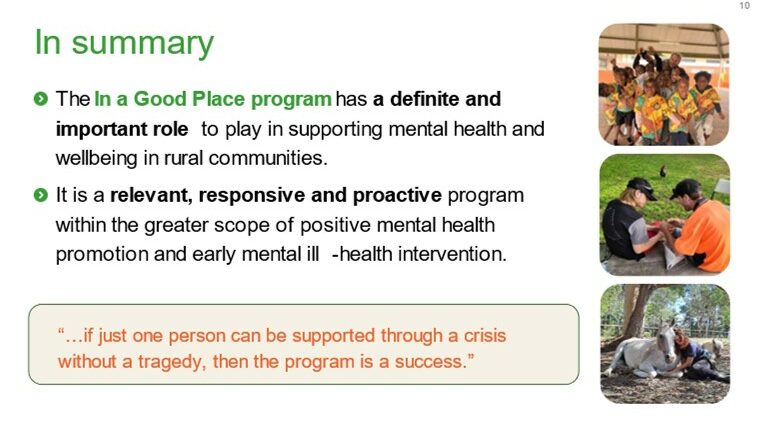
The In a Good Place program – and targeted small grants more generally, have a definite and important role to play in supporting rural communities to activate their ideas and solutions.
Analysis of final reports confirm that at a community level, the program has increased the knowledge and understanding of mental health issues in those rural communities, and helped to reduce stigma for those experiencing mental health challenges.
It is a relevant, responsive and proactive program within the greater scope of positive mental health promotion and early mental ill-health intervention.
We acknowledge that it is a relatively small contribution. But the communities we work with tell us they are forever grateful that the funds were available to support them.
One grantee sums this up perfectly, “If just one person can be supported through a crisis without a tragedy, then the program is a success.”
If you’d like to add your support to these kinds of impactful community-led projects, please contact our partnerships team.
Workshops for women
Goomalling Aboriginal Corporation in the Wheatbelt region of Western Australia, used their $19,605 In a Good Place grant, funded by CCI Giving for their project called Maangart Yorga (Jam Tree Woman) – a workshop series delivered over the course of a year to impart both traditional and life skills to Aboriginal women and girls.
The program was created for Aboriginal women experiencing poverty, isolation, domestic violence and mental health concerns, and Aboriginal girls, from twelve years old, who are at risk. The program aimed to increase social participation by providing relevant and culturally appropriate workshops and a culturally safe space for connectedness. The workshops enabled the re-emergence of yarning circles and connection to Country that has helped foster relationships with young Aboriginal girls and Elders and provide an ongoing support network.
Maangart Yorga was an initiative to provide a safe space for women and girls to come together, learn, share and connect. Delivered through a series of workshops over a year, the aim was to increase participation in social activity, enhance the sense of community connectedness, improve outlook and help participants make healthier choices.
The workshops included a wide variety of traditional art, yoga and meditation, and health and wellbeing presentations. A series of practical skills sessions and workshops were held for women to have greater confidence, such as:
The organisation reported that participants would come to the workshop filled with apathy, tiredness or stressed, but always left feeling fulfilled and empowered after each workshop. The workshops provided a set of skills that can be transferred amongst the community.
While the workshop roll-out was interrupted by maternity leave for the program manager, the silver lining was that her leave coincided with movement restrictions due to COVID, so there was no additional impact from the pandemic.
Sadly, participation rates were lower than expected due to deaths in the community of two female elders and the suicide of two young Aboriginal men. Grieving periods were long and resulted in non-attendance from some members. For some members, the Maangart Yorga was a saving grace and gave them something positive to focus on.
Overall, 16 women participated across the program (including 2 non-Indigenous ladies), with a good cross section of ages from 21 years to 61 years old. Four female Aboriginal facilitators, three local female non-Indigenous facilitators, and two local female-owned food businesses also benefited from the project.
The greatest success of the program was providing a consistent and safe space for women to meet and yarn about their experience, which assisted healing and created lasting connections. The group plans to continue to meet monthly to use some of the skills they’ve learned and to continue connecting with each other. The Council is working with the Goomalling Aboriginal Corporation to create a permanent space for the women to take ownership of so they can create and share culture.
For many remote, rural and regional communities, drought has been impacting families and businesses for years. Even though it is not always covered in mainstream news, those living in certain parts of Australia know all too well what lasting effects drought can have. For many working in the agriculture industry, the thought of current and future drought can be a stressful and frightening prospect with crops and livestock often hit the hardest. However, in each of these communities there is a fighting spirit, often driven by community-led groups and not-for-profits (NFPs) that work hard to support the wider community.
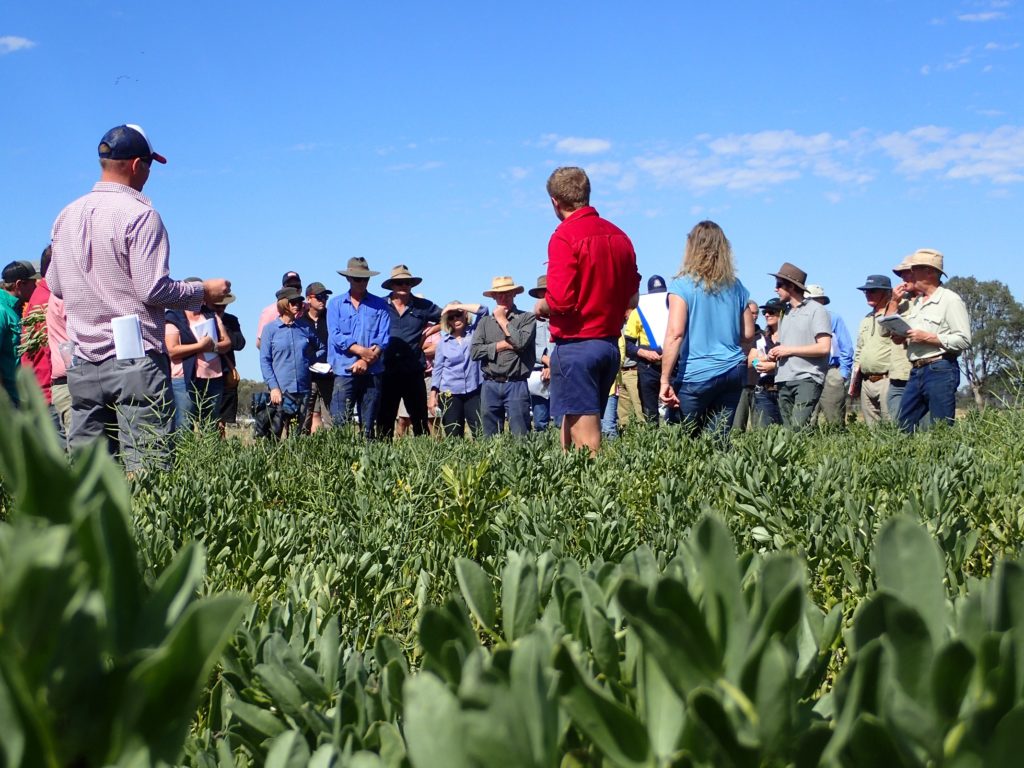
One of these groups is the Gippsland Agricultural Group who are driven by achieving results for farmers in the south east region of Gippsland in Victoria. The organisation is made up of Central and East Gippsland farmers and service providers that have joined forces as people with the shared desire to improve productivity, profitability and sustainability using research, collaboration, product trails and demonstrations to communities in the area.
One example of how Gippsland Agricultural Group planned to achieve this was by holding multiple field days. The Gippsland ‘Connect and Prepare’ field days were designed to build a sense of place and connection for farmers. Research conducted shows that farmers are most comfortable learning from other farmers in informal settings such walking around a paddock talking or learning while doing. For Gippsland Agricultural Group, providing resources like easy access to agricultural service providers, mental health and financial support, as well as strategies and tactics and practical learning, are all key to strengthening preparedness and resilience to future drought events.
Using a $42,920 grant through the Australian Government’s Future Drought Fund Networks to Build Drought Resilience program, Gippsland Agricultural Group held two farmer field days. Both days focused on farmer mental health and wellbeing by bringing health service providers to an environment where farmers are comfortable and feel they will be more likely to engage with services. Each day also featured key staff from other agricultural networks to encourage relationship development, project collaboration and sharing of ideas and resources. The first field day targeted producers, with a focus on networking and connecting with one another and relevant agriculture service providers.
While the field days are a great way to network and increase social interaction, the key purpose of the events is to build knowledge and skills with the estimated 200 producers, 15 agricultural agencies and service providers, and eight agricultural produce-led focus groups.
These events increased participant knowledge and understanding of the risks posed by drought by offering a program that shared information on climate variability. The events carried positive messaging about the resilience of regional producers focusing on practical, implementable drought preparedness solutions for everyday mum and dad farms.
In addition to funding the field days, the grant also enabled the installation of basic toilet facilities at a site frequently used for social and professional networking events. The community now has access to a space that supports educational, social and networking activities in a safe and hygienic space.
The close knit community of Quorn has been impacted by closure of local industrial businesses, prolonged drought, changes to lifestyle and isolation due to COVID-19, and recent deaths of long term residents. Service provider changes and short staffing had reduced available local support services. Things were seeming pretty bleak, so the town decided it was time to do something about it.
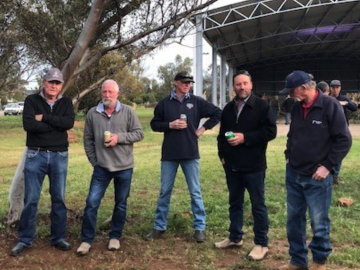
The Quorn Community Sporting Association requested funds to provide two free community events – one for the fellas and one for the ladies – providing an opportunity to come together, have a catered meal and listen to Stephanie Schmidt from ACT for Ag on building skills in psychological flexibility, gain some skills to help manage in times of stress, and take home some resources. While COVID-19 interrupted the original schedule, the events finally took place.
The Men’s Night Out was held on a Friday night at the new Quorn Pioneer Machinery Pavilion. The attendance of 93 men aged 10-96 exceeded expectation. All were able to enjoy the BBQ catering provided. The presentation was tailored for the men with plenty of opportunities for questions and conversation. A group of young Aboriginal men from the APY lands attended. They mentioned that they chose to come to the event as there weren’t any other events in the region. They engaged in the conversations and the presentation. Afterwards, Elders gave the following feedback:
‘The fellas had a great night thank you. We really need more of these nights for the area. We are also finding the lack of culturally appropriate services around and hope to network more with you all. We would love to do more and we can maybe host onsite where we are in the future.’
The next day, the Ladies High Tea took place at the Quorn Town Hall and was attended by 100 local women, including the local catering team. The hall was abuzz with conversation, whist cakes, sandwiches, tea and coffee were served in the good china! The ladies enjoyed their own tailored presentation from Stephanie which generated lots of questions and discussion.
Every participant at both events received an Act for Ag Toolkit which included an Act for Ag Handbook, Noticing Map notepad, Shared Purpose notepad, Values Cards and online resources to help build psychological flexibility and wellness.
Organisers received resounding positive feedback after both the events, with the community indicating they are very keen for more. The common theme from the feedback received was that the community valued was being connected with others in their community and looking out for each other.
$250,000 in grants awarded
FRRR’s In a Good Place (IAGP) program has awarded $250,000 in grants to 17 local organisations from remote, rural and regional Australia, for initiatives that will support and promote the mental health and wellbeing of locals in their communities.
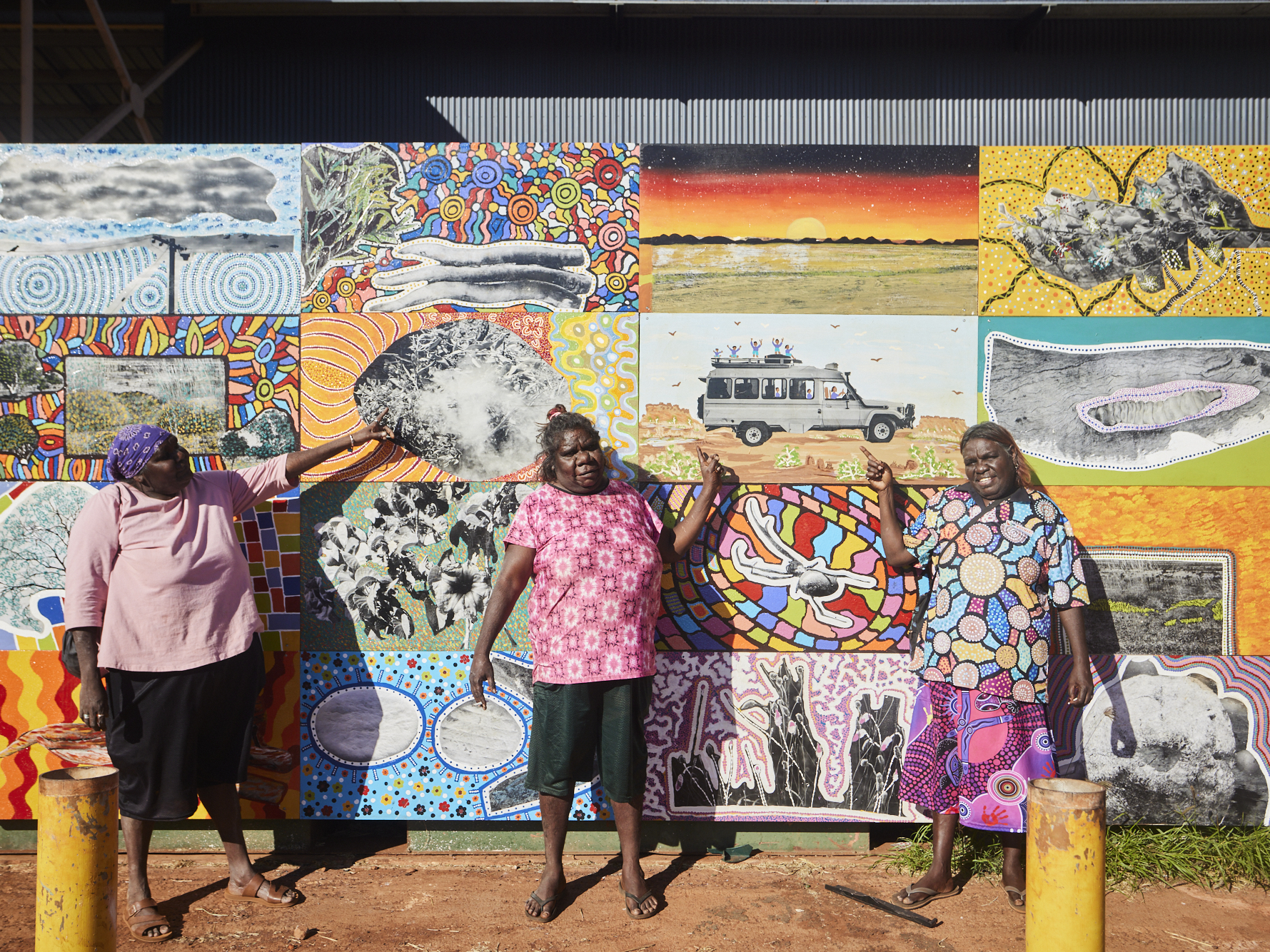
Funded in partnership with CCI Giving, the IAGP program gives small rural communities across Australia the opportunity to access funds of up to $20,000 for community-driven projects that support vulnerable community members who are at risk of, or are experiencing, mental health issues. Since 2018, the IAGP program has helped to fund 70 mental health-focused projects across remote, rural and regional Australia.
This year, the 17 funded initiatives include community activities to help people feel connected, training to help people identify those who are at risk of harming themselves, mental health first aid courses, and one-on-one mentoring.
Jeremy Yipp, Chair of CCI Giving, said support for mental health projects is vital for effective recovery to take place.
“In this round, we saw a notable increase in the number of expressions of interest that referenced community recovery from the accumulative economic, social and emotional impacts of successive natural disasters and the pandemic.
“We’re in a crucial period of recovery and now is the time to support mental health initiatives in rural Australia and make sure that communities have the resources they need to recover from all that’s gone on in the last few years,” Mr Yipp said.
Jill Karena, FRRR’s People Programs Portfolio Lead, said that loneliness is prevalent across rural communities and that many people are feeling disconnected from their community.
“In the applications for this round, we read about a lot of projects explicitly addressing loneliness and social isolation. For example, in the Queensland community of Stanthorpe, Happy Chat Peer Support Group will use a $20,000 grant to expand the organisation and provide facilitated support to vulnerable community members living with mental illness, helping to reduce their social isolation and loneliness, and to provide access to meaningful community-based activities.
“There is a clear need for social connection within remote, rural and regional communities and we’re grateful for our continued partnership with CCI Giving, as it allows us to provide much needed funding to help combat the loneliness we’re seeing in communities throughout rural Australia,” Ms Karena said.
Some of the 17 initiatives being funded include:
- Community Housing – Kempsey, NSW – Treasured Insights (Mental Health – Inside Out Recovery) – Build the capacity of community housing staff and tenants to understand hording and domestic squalor disorders to assist recovery and improve the lives of vulnerable people living in social housing. $14,588
- Sisters of Charity Community Care – Toowoomba, QLD – Dragonfly Health & Wellness Retreat – Enhance the mental health and wellbeing of rural women by providing a three-day retreat to enable participants to connect, learn self-care, and seek support. $11,000
- Yankalilla Youth Arts – Yankalilla, SA – Sunday Sessions – Provide a creative and nurturing space for young people to engage in guided arts and theatre-based activities, with the presence of a counsellor and support therapy dog to support mental health and wellbeing. $12,260
- Goulburn Valley Suicide Awareness Group Inc – Yea, VIC – GVSAG Walk and Talk – Support the local community to connect and develop trusted relationships that create greater understanding of mental health issues and address the stigma surrounding suicide by upskilling volunteers, establishing facilitated support groups and holding a suicide awareness walk. $20,000
- Enterprise Partnerships WA Limited – Balgo, WA – Piriwa Wellbeing Project – Develop individual resilience, confidence, group leadership and planning skills through intergenerational activities and regular yarning circles to strengthen cultural identity, self-agency and mental wellbeing of Aboriginal women in a remote community. $20,000
To support grants like this through FRRR, make a tax-deductible donation at https://frrr.org.au/giving/.
The full list of grant recipients and their projects are below.
| Organisation | Project | Location | Grant | |||
|---|---|---|---|---|---|---|
| In a Good Place - Round 7 - 2023 | ||||||
| NEW SOUTH WALES | ||||||
| Community Housing Limited | Treasured Insights (Mental Health - Inside Out Recovery) Build the capacity of community housing staff and tenants to understand hording and domestic squalor disorders to assist recovery and improve the lives of vulnerable people living in social housing. | Kempsey | $14,588 | |||
| Key Assets The Children's Services Provider NI-Connect Child and Family Wellbeing Unit | Norfolk Island Youth Centre Project Providing basic furnishings and equipment to facilitate the development of a local youth focused space promoting mental health and wellbeing and providing access to preventive and supportive programs. | Norfolk Island | $19,998 | |||
| Narrabri & District Community Aid Service Incorporated | R U OK Day and Suicide Prevention Business Evening Increase community awareness of mental health and reduce the stigma associated with help seeking behaviour by providing a community event with a guest speaker and take home resources. | Narrabri | $4,720 | |||
| Queer Family Inc | Resourcing Our Youth Increase community understanding and improve the confidence of young queer people to respond to homo/transphobia through the development and distribution of posters and local LGBTQIA+ mental health resources. | Mullumbimby | $13,000 | |||
| Rotary Club of Iluka Woombah Incorporated | Mental Health Warriors: Building Resilient Preteens Cultivate confidence and resilience in primary school children by supporting the development and delivery of a locally facilitated program to enhance student social and emotional wellbeing. | Iluka | $5,334 | |||
| Southern Women's Group Incorporated | Recovery Sanctuary Support the development of facilitated creative workshops and provision of materials to enable trauma informed workshops to take place in a safe and appropriate environment, supporting mental health, wellbeing and trauma recovery for women. | Bega | $11,000 | |||
| QUEENSLAND | ||||||
| Little Sparklers Ltd | Mental Health First Aid Training for Peer Support Volunteers and Volunteer Leaders Increase the knowledge and skills of rural-based peer volunteers, and increase the capacity of the organisation, by enabling Mental Health First Aid and Instructor training for those who provide phone crisis support for families during the postnatal period. | Various | $17,673 | |||
| Sisters of Charity Community Care Limited | Dragonfly Health & Wellness Retreat Enhance the mental health and wellbeing of rural women by providing a three day retreat to enable participants to connect, learn self-care, and seek support. | Toowoomba | $11,000 | |||
| Support Groups Queensland Inc Happy Chat Mental Health Peer Support Group | Happy Chat Mental Health Peer Support Stanthorpe - Building a Safe and Happy Place for People with a Lived Experience of Mental Ill Health Increase the capacity of a peer support group to expand and provide facilitated support to vulnerable community members living with mental illness to reduce social isolation, and to provide access to meaningful community based activities and nutritious food. | Stanthorpe | $20,000 | |||
| SOUTH AUSTRALIA | ||||||
| Tumby Bay Area School | Tumby Bay Area School G.E.M. Festival Build knowledge of, and community engagement with, the Gratitude, Empathy, Mindfulness (GEM) personal resilience initiative through a school based community event to highlight positive mental health and wellbeing. | Tumby Bay | $13,274 | |||
| Yankalilla Youth Arts Incorporated | Sunday Sessions Provide a creative and nurturing space for young people to engage in guided arts and theatre based activities, with the presence of a counsellor and support therapy dog to support mental health and wellbeing. | Yankalilla | $12,260 | |||
| TASMANIA | ||||||
| Highways and Byways Ltd Free2b Girls | Free2Fly Support isolated, vulnerable and disadvantaged young women to be confident and resilient through a one to one tailored mentoring program. | St Helens | $20,000 | |||
| VICTORIA | ||||||
| Castlemaine Safe Space Inc | Strengthen and Grow the Castlemaine Safe Space Increase organisational capacity and community awareness of available local mental health and social support by providing mental health training for lived experienced volunteers and increased promotion of the Castlemaine Safe Space. | Castlemaine | $13,000 | |||
| Goulburn Valley Suicide Awareness Group Inc | GVSAG Walk and Talk Support the local community to connect and develop trusted relationships that create greater understanding of mental health issues and address the stigma surrounding suicide by upskilling volunteers, establishing facilitated support groups and holding a suicide awareness walk. | Yea | $20,000 | |||
| HALT Hope Assistance Local Tradies | Older Adults Matter Too Increase the capacity and confidence of local community groups to better understand what a developing mental health problem or crisis looks like in older males and to have the skills and confidence to offer help-seeking information in an effort to reduce the incidences of suicide. | Castlemaine | $18,000 | |||
| WESTERN AUSTRALIA | ||||||
| Enterprise Partnerships WA Limited | Piriwa Wellbeing Project Develop individual resilience, confidence, group leadership and planning skills through intergenerational activities and regular yarning circles to strengthen cultural identity, self-agency and mental wellbeing of Aboriginal women in a remote community. | Balgo | $20,000 | |||
| Newdegate Community Resource Centre Inc | Men's BBQ Masterclass Workshop Enable men living in two farming districts to come together through a BBQ cooking demonstration and shared meal to hear a mental health presentation designed to reduce isolation and encourage open discussion about the importance of mental health self-care. | Newdegate | $16,153 | |||
Mission Australia has worked in partnership with Mid Coast 4 Kids to deliver ‘The Common Approach’ training to build capability for a whole of community response to child youth wellbeing in the Mid Coast region.
The Mid Coast was dramatically impacted by the South Eastern Australia floods in 2022. The townships of Taree, Wingham and Gloucester were inundated or compromised with flood waters and structural damage cutting communities off for long periods. There was flood damage to farm lands, residential housing areas and outlying communities. This disaster compounded significant stress that has been experienced in the communities for an extended period due to the impact of prolonged drought, COVID-19 and bushfires.
As a result, early childhood centres and schools reported increased anxiety and trauma-related behaviours in children and young people, and the service system was not coping, with allied health and other support services reporting wait times of more than 12 months.
‘The Common Approach’ has equipped a range of members of the Mid Coast community with the skills to have quality conversations and build resilience to respond to the wellbeing needs of children, young people and their families, now and into the future. In total, 228 people including community service, health and education professionals, community volunteers and parents were trained to have evidence based, holistic conversations with children and young people about all aspects of their wellbeing.
Participants report increased confidence in being able to support children and young people to identify strategies to improve individual wellbeing. “Through this intervention we have equipped our community to share responsibility for promoting and supporting the health and wellbeing of children and young people in our community, via evidence informed practice,” says Program Manager Bree Katsamangos.
“Additionally, practitioners will benefit from the opportunity to engage in a bi-monthly Community of Practice to support ongoing development and practice.”
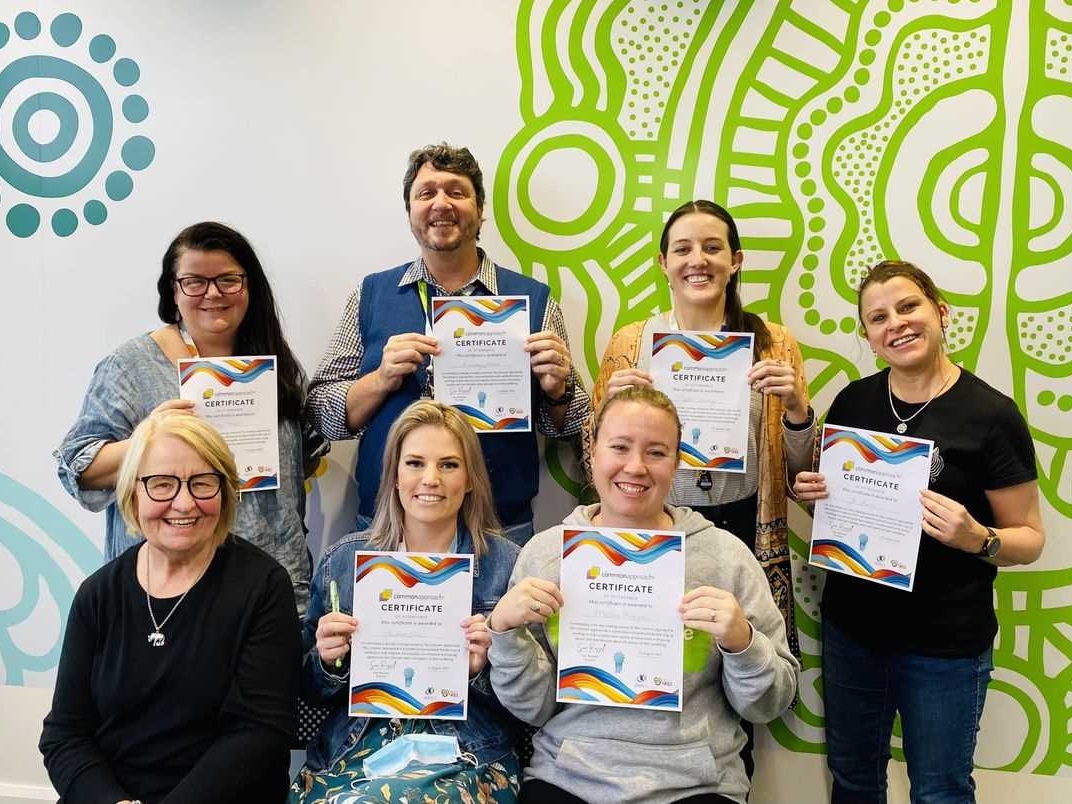
The community group I’m Not Afraid To Talk (INATT) partnered with the University of South Australia (UniSA) to deliver a mental wellbeing program through Greater Flinders and Eastern Eyre football leagues / clubs to help adolescent and adult men in rural communities to improve their mental health and reduce the risk of suicide.
Working around COVID restrictions, cancellation of the football season, harvesting and extreme weather events, workshops were held in Kimba, Tumby Bay and Cowell, with a joint follow up session via Zoom. The workshops were supported by a $19,900 In a Good Place grant that was funded by CCI Giving.
Each four-hour workshop featured local key speakers sharing their lived experienced, followed by a series of activities that focused on how men may be perceived by others and how they perceive themselves, share experiences, and the importance of ongoing open conversations about mental health. A Toolkit Resource was collaboratively developed by UniSA and INATT after the workshops to guide clubs in planning activities to promote mental wellbeing.
The steps and strategies listed in the resource are based on community development principles and give clubs ideas on how to get started with planning mental wellbeing activities. This was introduced during the follow up session and made available to each group.
Due to the changes to the program, there was an underspend of funds. With the permission of FRRR, INATT ran an additional workshop for women in Kimba. This was a great success with approximately 80 women attending from Kimba and surrounding communities.
The workshops were the greatest success of this project as was evident by the high praise received by participants. The workshops assisted in improving attitudes towards mental health and help seeking. Participants also reported an increase in confidence and comfort in discussing mental health. Some of the comments included:
- “Mental health discussion rarely starts without a major poke”.
- “Probably will never be comfortable to do this but more equipped to have a go”.
- “Eye opening and is going to help myself and community”.
- “Very well done to get tough blokes thinking and talking”.
- “We don’t have many supports, apart from each other at the moment”.
- “Reassuring to know you not alone, great advice on how to deal with mental health”.
- “Was a great night, confronting at times but that made it so worthwhile and a good laugh at the end”.
The achievements of this project have been numerous with the strengths of both collaborators on this grant put to best use. INATT has extremely strong links with the Greater Flinders and Eastern Eyre communities which was evident by their excellent leadership and facilitation of the workshops and the level of attendance.

